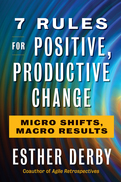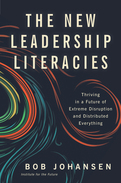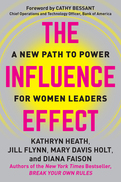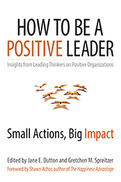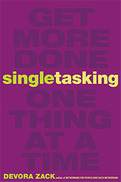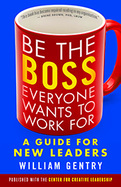Search Results: "Social Venture Networks/books/true-to-yourself.htm"
Results 337-342 of 345
Change is difficult but essential—Esther Derby offers seven guidelines for change by attraction, an approach that draws people into the process so that instead of resisting change, they embrace it.
Even if you don't have change management in your job description, your job involves change. Change is a given as modern organizations respond to market and technology advances, make improvements, and evolve practices to meet new challenges. This is not a simple process on any level. Often, there is no indisputable right answer, and responding requires trial and error, learning and unlearning. Whatever you choose to do, it will interact with existing policies and structures in unpredictable ways. And there is, quite simply, a natural human resistance to being told to change.
Rather than creating more rigorous preconceived plans or imposing change by decree, agile software developer turned organizational change expert Esther Derby offers change by attraction, an approach that is adaptive and responsive and engages people in learning, evolving, and owning the new way. She presents a set of seven heuristics—guides to problem-solving—that empower people to achieve outcomes within broad constraints using their personal ingenuity and creativity.
When you work by attraction, you give space and support for people to feel the loss that comes with change and help them see what is valuable about the future you propose. Resistance fades because people feel there is nothing to push against—only something they want to move toward. Derby's approach clears the fog to provide a new way forward that honors people and creates safety for change.
Even if you don't have change management in your job description, your job involves change. Change is a given as modern organizations respond to market and technology advances, make improvements, and evolve practices to meet new challenges. This is not a simple process on any level. Often, there is no indisputable right answer, and responding requires trial and error, learning and unlearning. Whatever you choose to do, it will interact with existing policies and structures in unpredictable ways. And there is, quite simply, a natural human resistance to being told to change.
Rather than creating more rigorous preconceived plans or imposing change by decree, agile software developer turned organizational change expert Esther Derby offers change by attraction, an approach that is adaptive and responsive and engages people in learning, evolving, and owning the new way. She presents a set of seven heuristics—guides to problem-solving—that empower people to achieve outcomes within broad constraints using their personal ingenuity and creativity.
When you work by attraction, you give space and support for people to feel the loss that comes with change and help them see what is valuable about the future you propose. Resistance fades because people feel there is nothing to push against—only something they want to move toward. Derby's approach clears the fog to provide a new way forward that honors people and creates safety for change.
Over the next decade, today's connected world will be explosively more connected. Anything that can be distributed will be distributed: workforces, organizations, supply webs, and more. The tired practices of centralized organizations will become brittle in a future where authority is radically decentralized. Rigid hierarchies will give way to liquid structures. Most leaders—and most organizations—aren't ready for this future. Are you?
It's too late to catch up, but it's a great time to leapfrog. Noted futurist Bob Johansen goes beyond skills and competencies to propose five new leadership literacies—combinations of disciplines, practices, and worldviews—that will be needed to thrive in a VUCA world of increasing volatility, uncertainty, complexity, and ambiguity. This book shows how to (1) forecast likely futures so you can “look back” and make sure you're prepared now for the changes to come, (2) use low-risk gaming spaces to work through your concerns about the future and hone your leadership skills, (3) lead shape-shifting organizations where you can't just tell people what to do, (4) be a dynamic presence even when you're not there in person, and (5) keep your personal energy high and transmit that energy throughout your organization.
This visionary book provides a vivid description of the ideal talent profile for future leaders. It is written for current, rising star, and aspiring leaders; talent scouts searching for leaders; and executive coaches seeking a fresh view of how leaders will need to prepare. To get ready for this future, we will all need new leadership literacies.
It's too late to catch up, but it's a great time to leapfrog. Noted futurist Bob Johansen goes beyond skills and competencies to propose five new leadership literacies—combinations of disciplines, practices, and worldviews—that will be needed to thrive in a VUCA world of increasing volatility, uncertainty, complexity, and ambiguity. This book shows how to (1) forecast likely futures so you can “look back” and make sure you're prepared now for the changes to come, (2) use low-risk gaming spaces to work through your concerns about the future and hone your leadership skills, (3) lead shape-shifting organizations where you can't just tell people what to do, (4) be a dynamic presence even when you're not there in person, and (5) keep your personal energy high and transmit that energy throughout your organization.
This visionary book provides a vivid description of the ideal talent profile for future leaders. It is written for current, rising star, and aspiring leaders; talent scouts searching for leaders; and executive coaches seeking a fresh view of how leaders will need to prepare. To get ready for this future, we will all need new leadership literacies.
The Influence Effect
2017
Women hold over half of all professional jobs today, yet they represent just four percent of CEOs in the S&P 500. Even worse, that percentage has barely budged in a decade.
That's where The Influence Effect comes in. Based on recent research by the authors of the New York Times bestseller Break Your Own Rules, this book begins with the premise that when it comes to political savvy, what works for men at work won't work for women. Packed with the authors' coaching insights and their “Big Five” strategies designed specifically for female executives, this book guides women to break past political barriers and get right to what they really want—influence.
Authors Kathryn Heath, Jill Flynn, Mary Davis Holt, and Diana Faison make success far less complex, helping women overcome entrenched resistance to their ideas, create their own access points to power, and attract followers in a way that works for them. They present tools such as Influence Loops (to organically increase influence), Personal Scaffolding (to grow a groundswell of support), and Scenario Thinking (a savvy twist on strategic planning). These and other smart strategies finally allow women to succeed on their own terms.
Illustrated with dozens of engaging, real stories culled from the authors' many years of coaching experience, The Influence Effect moves women past the politics problem and offers a new path to power. Actually, it's more than a path—it's a runway—it frees women to take off in their careers on their own terms. The Influence Effect will work for women, not because gender barriers will no longer exist, but because they will no longer hold women back.
That's where The Influence Effect comes in. Based on recent research by the authors of the New York Times bestseller Break Your Own Rules, this book begins with the premise that when it comes to political savvy, what works for men at work won't work for women. Packed with the authors' coaching insights and their “Big Five” strategies designed specifically for female executives, this book guides women to break past political barriers and get right to what they really want—influence.
Authors Kathryn Heath, Jill Flynn, Mary Davis Holt, and Diana Faison make success far less complex, helping women overcome entrenched resistance to their ideas, create their own access points to power, and attract followers in a way that works for them. They present tools such as Influence Loops (to organically increase influence), Personal Scaffolding (to grow a groundswell of support), and Scenario Thinking (a savvy twist on strategic planning). These and other smart strategies finally allow women to succeed on their own terms.
Illustrated with dozens of engaging, real stories culled from the authors' many years of coaching experience, The Influence Effect moves women past the politics problem and offers a new path to power. Actually, it's more than a path—it's a runway—it frees women to take off in their careers on their own terms. The Influence Effect will work for women, not because gender barriers will no longer exist, but because they will no longer hold women back.
Positive leaders are able to dramatically expand their people's—and their own—capacity for excellence. And they accomplish this without enormous expenditures or huge heroic gestures. Here leading scholars—including Adam Grant, author of the bestselling Give and Take; positive organizational scholarship movement cofounders Kim Cameron and Robert Quinn; and thirteen more—describe how this is being done at companies such as Wells Fargo, Ford, Kelly Services, Burt's Bees, Connecticut's Griffin Hospital, the Michigan-based Zingerman's Community of Businesses, and many others. They show that, like the butterfly in Brazil whose flapping wings create a typhoon in Texas, you can create profound positive change in your organization through simple actions and attitude shifts.
Singletasking
2015
Your Mind Can't Be Two Places at Once
Too many of us have become addicted to the popular, enticing, dangerously misleading drug of multitasking. Devora Zack was once hooked herself. But she beat it and became more efficient, and you can too.
Zack marshals convincing neuroscientific evidence to prove that you really can't do more by trying to tackle several things at once—it's an illusion. There is a better way to deal with all the information and interruptions that bombard us today. Singletasking explains exactly how to clear and calm your mind, arrange your schedule and environment, and gently yet firmly manage the expectations of people around you so that you can accomplish a succession of tasks, one by one—and be infinitely more productive. Singletasking is the secret to success and sanity.
Too many of us have become addicted to the popular, enticing, dangerously misleading drug of multitasking. Devora Zack was once hooked herself. But she beat it and became more efficient, and you can too.
Zack marshals convincing neuroscientific evidence to prove that you really can't do more by trying to tackle several things at once—it's an illusion. There is a better way to deal with all the information and interruptions that bombard us today. Singletasking explains exactly how to clear and calm your mind, arrange your schedule and environment, and gently yet firmly manage the expectations of people around you so that you can accomplish a succession of tasks, one by one—and be infinitely more productive. Singletasking is the secret to success and sanity.
Flip Your Script!
You've been promoted to leadership—congratulations! But it's nothing like your old job, is it? William Gentry says it's time to flip your script.
We all have mental scripts that tell us how the world works. Your old script was all about “me”: standing out as an individual. But as a new leader, you need to flip your script from “me” to “we” and help the group you lead succeed. In this book, Gentry supports and coaches you to flip your script in six key areas. He offers actionable, practical, evidence-based advice and examples drawn from his research, his work with leaders, and his own failures and triumphs of becoming a new leader. Get started flipping your script and become the kind of boss everyone wants to work for.
You've been promoted to leadership—congratulations! But it's nothing like your old job, is it? William Gentry says it's time to flip your script.
We all have mental scripts that tell us how the world works. Your old script was all about “me”: standing out as an individual. But as a new leader, you need to flip your script from “me” to “we” and help the group you lead succeed. In this book, Gentry supports and coaches you to flip your script in six key areas. He offers actionable, practical, evidence-based advice and examples drawn from his research, his work with leaders, and his own failures and triumphs of becoming a new leader. Get started flipping your script and become the kind of boss everyone wants to work for.


